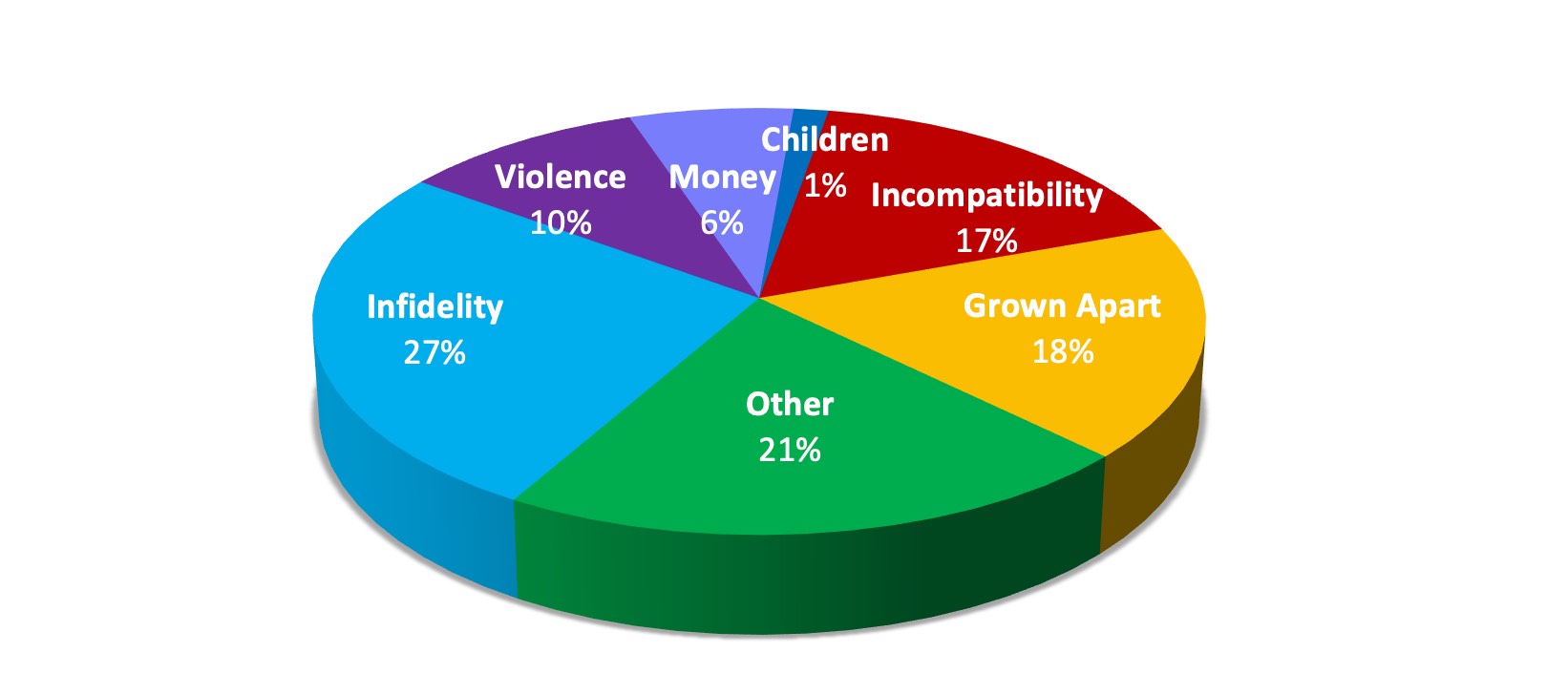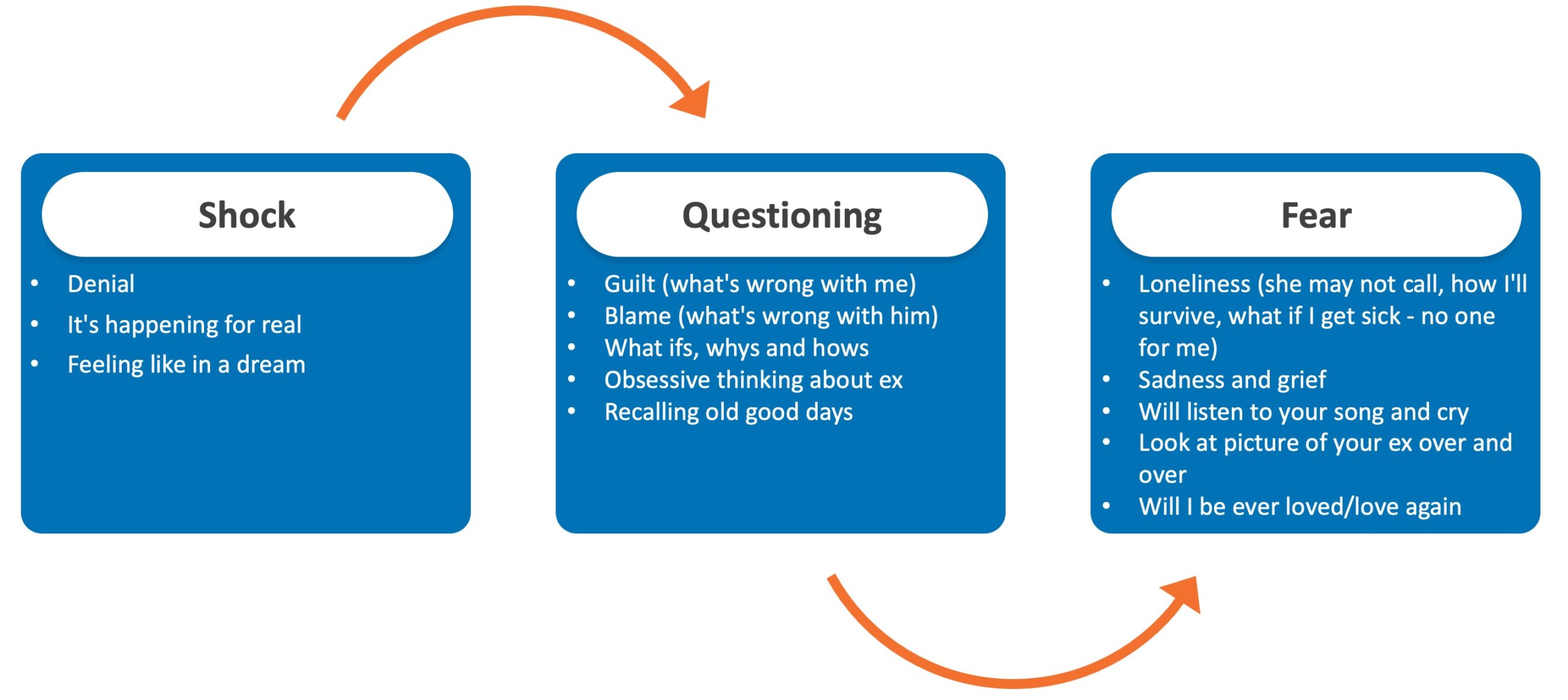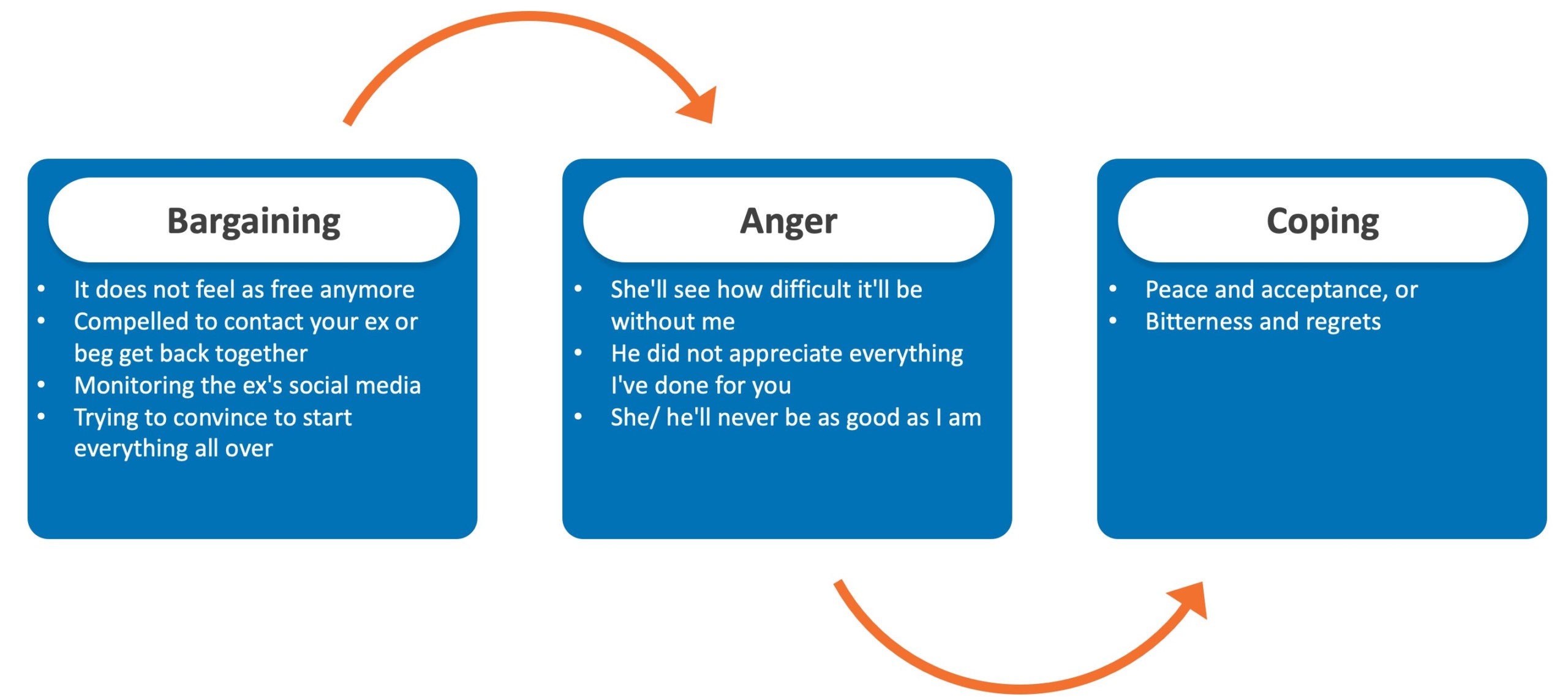
While divorce may feel like a desired resolution and a new life beginning, it is often not the end of a relationship. There are ones to still be found with no tears, no regrets, no anger, no bitterness, no children suffering, no blended family issues… Often, we see a person carry those negative emotions toward the ex for many years. When we sit down and talk, whether a man or a woman, at the core, we see a wounded soul that hasn’t had the time to heal after the painful break-up, separation, or divorce.
Understanding of the heart or soul in our society is polarized. While some say it does not exist, others adamantly try to prove the opposite. We’ll describe the soul as the feelings that dwell inside of you. When those feelings get hurt, men’s or women’s, repeatedly, knowingly or not knowingly, over time, sooner or later, it creates a rift between both loving hearts.
Causes of the Divorce/ Break-up
According to a research, the most commonly reported major contributors to divorce are:
- Lack of commitment
- Infidelity
- Conflict/arguing
The most common “final straw” reasons were: infidelity, domestic violence, and substance use. More participants blamed their partners than blamed themselves for the divorce.
Here are the results of another research
Reasons for Divorce
WomansDIvorce.com survey results

| Answers | Percentage | Responses |
|---|---|---|
| Infidelity | 26.6% | 813 |
| Violence | 9.8% | 299 |
| Money | 6.6% | 201 |
| Children | 1.4% | 44 |
| Incompatibility | 16.7% | 512 |
| Grown Apart | 17.7% | 542 |
| Other | 21.1% | 646 |
Incompatibility/Irreconcilable differences: religious, career goals, cultural, communication issues, intellectual, problems with parents/ in-laws, money management styles, sexual needs, financial goals.
Children: decision to have children, fighting over discipline, difference in parenting styles, parenting duty inequity, step-children issues.
Grown apart: married too young, constant fighting, lack of commitment, midlife crisis, leading separate lives, immaturity, no respect to a partner.
Other causes: abusive behavior, controlling behaviour, major life changes (job loss, major illness of the spouse of family member), mental issues, criminal behavior, sexual dysfunction, addictions (alcohol, drugs, gambling, porn), desertion, child abuse.
Marriage Stages and Issues
According to David Schnarch, author of the book “Passionate Marriage”, there are 2 periods in marriage when people break apart the most:
- 5.6 years of marriage
- 14 years of marriage
The first break-up point (5.6 years) is often connected with:
5 main causes (though these may affect the relationship at any stage):
1. Contempt

Contempt means not accepting, not respecting or not valuing an individual the way he/she is. Contempt is usually subtle.
Examples:
A spouse constantly points out flaws to the other or is verbally abusive.
A spouse is disinterested/ disrespectful to the other spouse’s opinion.
A spouse feels “ashamed” for the other one in social situations.
2. Complaints

A reason why spouses frequently complain about each other is because they subconsciously see a “potential” in another individual to “get better at” and hope to help the person to grow to that potential. However, this rarely works.
Examples:
A spouse is unhappy with the house they live in, not having enough clothes to wear, food that is prepared, how she looks, “good cop/bad cop” parenting etc.
A spouse does not like how the other one does chores, or is not happy the way he/she does a number of things (it irritates him/her).
A spouse complains about the other spouse’s tendency to complain.
3. Competition

Competitive relationship vigilantly keeps scores. While both partners should contribute to the relationship with eagerness, the reality is that people significantly differ in personalities, upbringing, standards, priorities, skills and working hours. At times one spouse may go through emotional or physical health challenges. Without compassion and patience, the scoring system may lead to mutual bitterness and resentment.
Examples:
A spouse ensures a “fair” distribution of every single chore, including number of changed diapers, prepared meals and done dishes.
A spouse uses sex as a reward and punishment (with scores count in the background).
One spouse gets better at something, the other one starts envying.
4. Compromise

We do not mean a positive aspect of compromise when two parties find the most suitable decision to meet one another’s needs. David Schnarch uses this term to describe a situation when both partners are settling for less than ideal, trying keeping another person happy, while compromising who they are inside, not knowing how to communicate, or how to find a way explain their need through resistance or self-defence of another spouse.
Examples:
A spouse feels lack of self-actualization. He/she feels undervalued by a more dominant spouse, withdraws and becomes emotionally unavailable.
A spouse’s emotional or sexual needs are not met. As a result, he/she becomes mean or withdraws, yet not able to express the needs openly.
A spouse is exaggerating or lying. The other spouse avoids bringing it up, being afraid of not being understood or not able to change things.
5. Communication (this point is added by us).

“The single biggest problem in communication is the illusion that it has taken place”.
George Bernard Shaw
The matter is not that couples do not talk. They discuss daily news, kid’s school and what to buy. But at times they may not be able to express their inner feelings and desires out of fear of not being understood, judged, ridiculed, or hurting another partner’s feelings. They may also have difficulty explaining or getting through to each other, or shut down after a negative reaction. Yet, in essence, it is mostly about different perspectives.
Example: Letter from a Spouse
“From the very start of our relationship, my husband was very controlling and had a very serious anger problem… I’m just tired and I have a strong desire to move forward into my latter years without feeling like I have to walk on eggshells around him. I have bent over backwards to make sure my husband feels respected, cared for and loved. I encourage him, I always speak very highly of him and I am always available for him intimately. I feel like I need to divorce this man because he still has not learned to respect me. When my daughter was younger, he was always impatient, verbally and physically abusive, bullied me and was very arrogant and selfish. Although he is no longer physically abusive, he is still very verbally abusive.”
Response from a man (not from the same couple):

The eggshells? I never heard this before, I did not know. I have never been physically abusive but looking back I was verbally. About once a month I would blow up about something stupid and turn an issue or small argument into a giant fight always trying to prove I was right. I have always been faithful and to me we had a good marriage. But I never knew.
Vowed to tell my wife how much I love and adore her every day, many times a day. I send her every morning a “Love text” telling her how I appreciate her. I call her, I ask her about her day, I do something nice for her every day.
I connect with her each day; drinks out of the house, just talking at night, in bed.
I am seeing a counselor to help with the anxiety and help me forgive the infidelity knowing the bigger picture, the marriage is more important.
I am getting out of my comfort zone so I don’t slip back – I switched sides in the bed so I wake up every morning reminding myself that things must be different. I hated to dance but she loves it, so I dumped $2k into dancing lessons for me.
I carry in a small container of eggshells in my pocket so I never forget.
I WOULD HAVE done all of this without the declaration of divorce if I only knew. We men are dumb creatures; if you want the marriage to work find a way to get through to him. Have a friend help, anything, but you need to tell him how you feel.
Tell him!”
Summary:
The two letters above do not necessarily talk about similar issues, and in the first case, long-term physical abuse may have been involved, but they both use the expression “walking on eggshells.” One interpretation is that the phrase describes a natural behaviour around someone “erratic, unpredictable, and explosive”. On the flip side, the statement may mean an “inability to express one’s feelings in a safe or effective way, leading to consistent internal suffering and alienation”.
Despite a common perception that you get to know each other well when living under one roof, two spouses may stay together for years and never openly discuss their feelings with each other in a way they feel seen and understood. Being vulnerable and open and having the ability to share our needs with our loved ones in a non-blaming, respectful, easy-to-understand, and relatable way is not a natural skill. We often lack patience and understanding of how to get through to our partners. When feeling misunderstood or dismissed after a few attempts to share, many of us tend to shut down and start keeping our feelings to ourselves.
The second break-up point (14 years) is often connected with:
Lack of nurture of a particular area of a marriage or the relationship as a whole.
It is just like not watering or not weeding your garden and just letting it grow on its own. You may start with healthy seeds, but without proper conditions, they may not thrive or be taken over by weeds.
You have had for a while unresolved constant financial issues, ignoring or not resolving sex need differences, issues with in-laws, etc. At first, it did not matter, but over time, the unresolved life situation or behaviour may make you feel unsafe, frustrated, unsatisfied, ignored or desperate, which leads to trust issues between you two.
Or your relationship may not be bad overall, but it just becomes more and more transactional, revolving around the kids or work. You are not spending time for heart-to-heart conversations anymore. When you come home, your spouse does not come to greet you and just pointlessly stares at TV or social media. Maybe you feel that your spouse is not interested in the same things you are or has not put as much effort as you into self-care, self-growth, and self-betterment as you would like him/her to.
Life takes over, we get busy, we feel overwhelmed, we do not get our hands on it, we do not consider it important, we do not know what to do with it…
There is nothing more frustrating and sad than a nagging feeling that, while living together, you are growing apart.
Post-Break-up Recovery Stages
“Breakthrough follows a break-with, break-apart, a break-up, or a break-down.” – author unknown
Soul Healing

You may want to finally close that page, to get distracted or to start a new relationship. However, trying to simply move on with life while leaving your emotional centre unrecovered is not enough.
Partnerships are like glue, like a smoking addiction – they contain a lot of small “threads,” consisting of good and bad memories, strong emotional experiences, other friends and families that became part of the lives of both of you. Those threads bond and hold. Trying to cut them all at once may feel like cutting your heart without an anesthetic.
Healing your broken soul is a process. You need to give it space and time, and though you may want to do it on your own, you need help on that journey.
Healing Your Pain Bodies

No one wants to hurt another person. Everyone wants to have a great relationship when they start. However, the main reason why this intention at times isn’t fruitful is that most of us come into a relationship with luggage. We hope that that luggage somehow will diminish with the presence of love and care in our lives. But the opposite starts happening. The two luggage bags combine and create a worse concoction than one.
Because of our past negative experiences, we may get triggered and hurt by small or imaginable things another person “did to us” and unintentionally hurt him/her through our reactive behaviour. Our unhealed wounds, anger issues, and neediness may manifest in most unexpected and excessive ways. We may come up with wrong assumptions or self-produced negative thoughts, becoming self-fulfilling prophecies. Often, these stem from the unhealthy relationship patterns we absorbed from our parents growing up or from negative relationships of the past.
Unfortunately, a new person in our life, even the most amazing one, will not be able to fix this. The dysfunction we may bring from the past does not magically evaporate. After you start a relationship, all that luggage from both sides starts coming at you. At times, you do not even realize what’s happening, but those “explosions,” reactions, and hurts we exchange year after year leave an aftertaste and, over time, produce scars.
In school or social media, we are taught everything except how to reset our relationships or how to regularly cleanse them from the dust of accumulations of daily stresses, small misunderstandings and hurt feelings. The luggage of negativity weighs more and more on our relationships and makes them bitter day by day until they turn totally sour and we reach the point of no return.
After reading the above, you may start feeling hopeless. The feeling that your relationship has not succeeded may make you feel terrible, and you may even be tempted to think that it would be best if you had never started it. However, a wise man said that a person who came through three failed relationships is better off than one who has lived on an uninhabited island all his/her life. This allegory is meant to show that every experience is an opportunity to learn and grow; no matter what you’ve been through, you can heal and become a better version of yourself.
Even if your relationship can never be reversed or restored, it is important you do not regret the past. Regrets are a sure way to repeat the past, poison your present and destroy your future. Faith in your ability to heal and transform your life into what you want it to be, and the joy of noticing every day’s beautiful moments is what will help you bring your life back. You may not feel all of those at the moment, but you must believe that you are a beautiful soul who has incredible potential, and wherever you are, it is just a small part of your journey, and that a beautiful journey is still about to unfold.
Just because you made a mistake or taken a step back in your life, it is not over. Do not let the shame and guilt paralyze you with “shoulda,” “woulda,” or “coulda.” What is most important is that you give yourself permission to start healing the pain, releasing the past and to use the acquired knowledge to create your desired future.
Healing is your right and expression of self-love and forgiveness.
When you are broken, you cannot choose anything but healing because healing is your path back to wholeness.
What Can Fresh Start Do for You?
- Give you a life break. To be away from your day-to-day trauma reminders, connections that cause you pain. You cannot think in that environment or make a change.
- Support. You’ll be surrounded by other people who, just like you, go through various life challenges (you are not alone!). Feeling connected and supported will nourish your soul and nurture your self-esteem. You’ll be able to see yourself through the eyes of other people who will see you for who you are and not through the filter of your trauma.
- Emotional and energetic release. You have a big load on your chest that is unbearable. There are many ways how we can help you to lighten it, to start removing and letting go. Body treatments, hydrotherapy and somatic therapy, are just some of them. They may not work instantly, but most people feel better within a few weeks.
- Basic needs care and nutrition. You probably haven’t been taking care of yourself recently, eating junk, or not eating at all. This does not help your moods, weight, or digestion. At Fresh Start, you’ll get quality health nutrition and support for your body organs, and it will help you get back on track.
- Daily Structure. The semi-flexible structure at the retreat will help you to get up and go to bed at certain times, to start restoring sleep patterns, to move and hydrate your body, and not to stay in bed all day.
- Come back to senses. You will be able to feel more grounded and well. You’ll be able to see more clearly where you are at, where you want to go and be prepared to go back to the real world.
- Start peeling layers of the onion. Trauma has layers and layers, starting from your upbringing to the school environment. All of that spilled into your relationship. You need to forgive yourself and start healing that old stinky past, to believe that you can build a new future based on learning from the past. When you feel better physically (which our program helps a lot with), you’ll be able to go deeper into the wound and let it start healing.
Key to Success:
- Only those who realized that they have had enough of fighting and fantom game of holding on to the pain, to use it to “revenge” the other person;
- Only those who got tired of being cold, non-supportive and disrespectful to their “ex,” looking for every possible way to retaliate;
- Only those who were sick of the hate and said: I am done with this war. I want to wake up without tears, regrets, anger, fear of, shame. I want to have peace inside of me, enjoy life without fear of being haunted by the past. I want to be able to focus on my new relationship, new life, new experiences, rather than being sucked into rights or wrongs and “why did it happen to me” of the past –
Only those guests were able to start transforming their life and health.
Disclaimer:
We can help only those who have had enough of the past and are ready to look for help and to move forward. Otherwise, the entire time you’re at Fresh Start, you’d be thinking about how to vindicate, and this would keep you in a place where healing is not possible.
Anger is like poison, which one drinks and hopes that someone else will die of it. Are you done with drinking the poison of regrets and desire to vindicate or to be right and the suffering that comes from those? If the answer is yes, there is hope and help for you. And there is a future.
Please read the story of Melissa, who has participated in the Fresh Start Emotional Wellness program and was able to come out of deep depression brought about by personal trauma and improve her self-esteem and self-worth.
Disclaimer:
Though we have professional staff with advanced health expertise and most of our guests receive deep health results, the Fresh Start cannot guarantee health recovery from any specific disease or symptom, as the healing process is individual, gradual and depends on many factors. Please be realistic in expectations as there is no such thing as quick fixes when it comes to healing.





